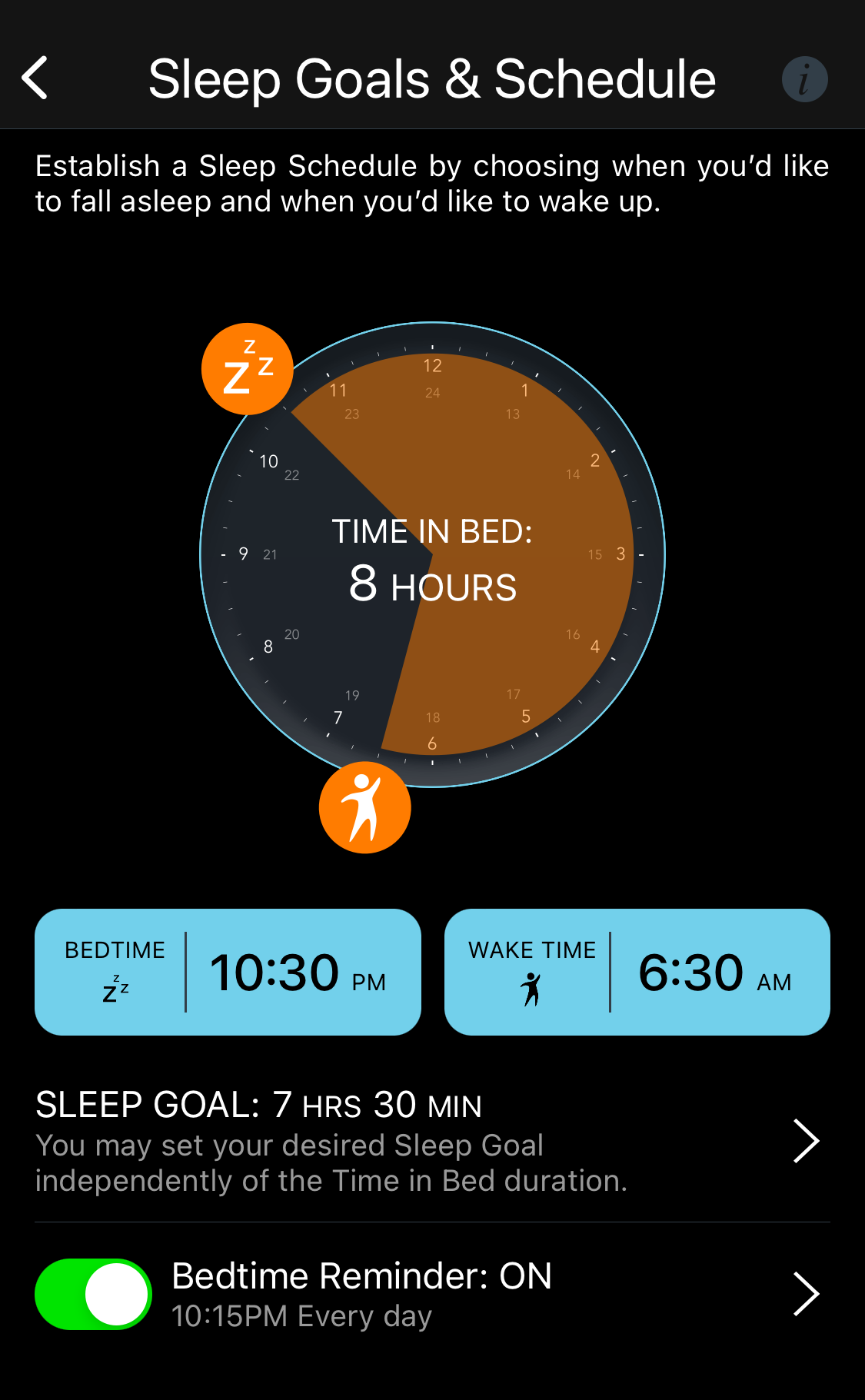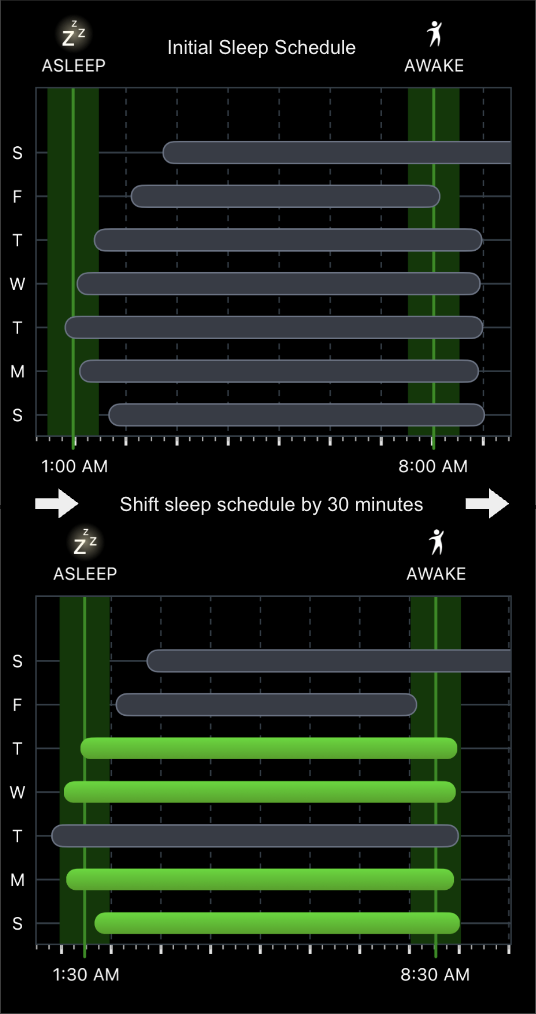Sleep Schedule
Why a Sleep Schedule is Important
Maintaining a consistent sleep schedule is one of the most important things you can do to get more sleep and improve the quality of your sleep. Among other things, setting and maintaining a similar bedtime and wake-up time can help your circadian rhythm stay in tune with your sleep cycle.
Your circadian rhythm is the internal clock that makes you feel tired at night when it’s time for bed and makes you feel alert in the morning when it’s time to wake up. A part of your brain called the hypothalamus controls your circadian rhythm, but it can also be affected by outside factors such as light (natural or artificial) and darkness. When your eyes sense that it’s dark out, they send a signal to the hypothalamus that you should feel tired, and your brain, in turn, sends a signal to your body to release melatonin, which makes your body tired.
Your circadian rhythm works best when you have regular sleep habits, like going to bed and waking up around the same time from day to day, including weekends. People, in general, have a difficult time adjusting to changes in sleep patterns. Sleeping later on the weekends, for example, will not fully make up for loss of sleep during the week, and can make it harder to wake up early when the work week starts again.
There are times your body will tell you that you need extra sleep. It’s okay to go to bed earlier than your bedtime when you are abnormally tired from a poor night of sleep, a stressful day, jet lag, fighting a cold or the flu, etc. Just do your best to maintain a consistent wake-up time so you feel tired at the appropriate time the next night. This will make it easier to get back to your normal sleep schedule once your body has recovered.
To set up your target bedtime and wake time, open the app then select Menu > Sleep Goals & Schedule. Drag the moon icon to set your bedtime and the sun icon to set your wake time. Your time in bed should be at least 10-20 minutes longer than your sleep goal to allow some time for falling asleep and brief wakeups in the middle of the night.

Expert Advice
Sleep expert Dr. Chris Winter, author of The Sleep Solution, offers the following advice:
“I have been asked frequently over the years the following question: ‘What is the single most important piece of advice for achieving your best sleep?’ To me, it’s easy: pick a wake-up time and stick with it!
When I ask you, ‘What time do you wake up in the morning?’ the answer should be one simple time. If your answer to that question is ‘I get up at 6:45 and usually go to the gym or run outside,’ you get a gold star.
Optimally, an individual should have a consistent bedtime and perhaps more important a consistent wake time.”
If you find yourself frequently feeling overly tired, try maintaining your wake-up time and move your bedtime 15 minutes earlier. Over the course of a week, you’ll get close to an extra two hours of sleep.
How to Get on a Sleep Schedule
Consistency is Key
Choose a realistic bedtime and wake-up time, then stick to these as much as life allows. Try not to sleep in for more than an hour or so on weekends. Your circadian rhythm will start acclimating to this schedule after just a few days, which will help you fall asleep faster at night and wake up more easily in the morning.
Make Incremental Adjustments
Make small changes to your sleep schedule slowly. If you typically go to bed at midnight, for example, and your goal is to get to bed by 11:00 pm, try this: For the first few nights go to bed at 11:45 pm, then for the next few nights go to bed at 11:30 pm. Working your way back to your goal 15 minutes at a time will make it easier for your body to adjust.
Morning Sun
Your circadian rhythm is sensitive to light exposure, so when you first wake up, open your shades or, weather permitting, go outside for a few minutes. This will cue your brain that your day is starting and help you feel more alert.
Dim Your Lights
Over-exposure to light in the evening can send a signal to your brain that you should stay awake. About an hour before bed, try turning off bright overhead lights, and if possible avoid the use of blue light emitting electronics such as TVs, tablets, phones, and computers. If you must use these devices, dim the screen and/or use glasses with a blue light filter.
Resist the Snooze Button
Try to resist the temptation to use your snooze button in the morning if you need an alarm to wake up. Instead, set your alarm for the time you actually have to get out of bed. It will often take your body a few minutes to wake up and adjust to daytime. After a while, this will occur more naturally, and you may not even need an alarm.
Dinner Plans
Eating dinner at about the same time each night will help keep your body clock on track. Try to eat your last meal two to three hours before going to bed, and limit your fluid intake to avoid waking up to use the bathroom multiple times per night. Avoiding caffeine, alcohol, and nicotine in the evenings will also help since these stimulants can take several hours to wear off.
Making Changes to Your Sleep Schedule
If you find yourself having difficulty meeting your target bedtime and/or morning wake-up time, your body’s internal clock may be telling you something, and it could be beneficial to adjust your sleep schedule targets. Consider the example below. This person set a target bedtime of 1:00 AM, and a target wake-up time of 8:00 AM. Over each of the past 7 days, they failed to maintain this schedule. Notice, however, their bedtimes and wake-up times were actually fairly consistent, which is good from a sleep schedule perspective. If they simply shifted their schedule by 30 minutes later on both ends, they would have achieved their goal 4 out of the last 7 days (shown in the second graph below with the green bars), and they may find continued success with this schedule moving forward.
Consistency is among the most important ingredients to achieving better sleep. So try setting a realistic sleep schedule that allows you to achieve success. Once you start meeting your schedule on a regular basis, if you need to make changes, do so incrementally (e.g. 15 minutes at a time).

Learn more:
- National Institutes of Health < https://medlineplus.gov/magazine/issues/summer12/articles/summer12pg20.html >
- W. Chris Winter, MD, The Sleep Solution, first edition. New York: New American Library, 2017.